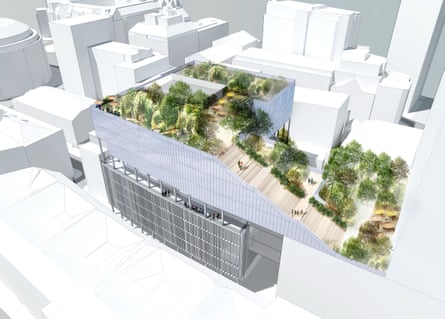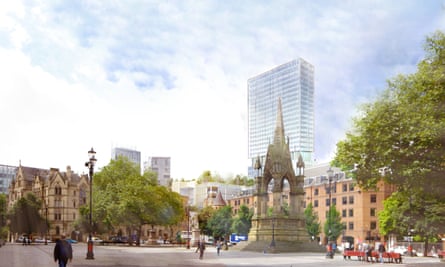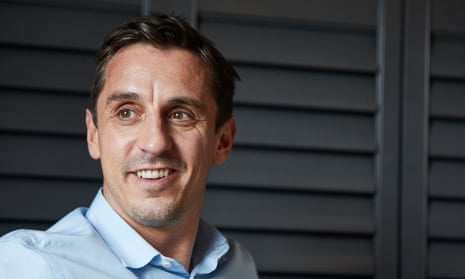It was one of the more unexpected football headlines of recent years: Gary Neville and Ryan Giggs opening a “hotel for the homeless”.
The Manchester United stars-turned-property developers had allowed a group of 50 rough sleepers to camp out in one of their most prestigious buildings in Manchester city centre for the winter.
In October 2015 the homelessness activist group Manchester Angels had declared squatters rights in the grade II-listed former stock exchange, which the footballers were in the process of converting into a boutique hotel and private members club, complete with spa and roof terrace.

Rather than turf the group out, Neville allowed them to stay for five months in what he now describes as “a very successful project” that he says cost him £150,000 but saw 40 of the original group rehoused.
Twenty “relapsed” and are back on the streets, he says, despite “great work” from the council to keep them on the straight and narrow. He is very proud that some of the squatters are off drugs and on their way back into regular society.
Inviting the homeless to stay was not a PR-driven move, he insists: “We did what we believed to be the right thing for five months. Not for anything other than purely the right thing. We walk around the city, we know those men and women, we talk to them, and the idea of saying to them ‘no, get out, go back on to the street’ when actually we had a building there we weren’t using for five months was wrong.”
The temporary residents didn’t just want homes, but attention and even hugs, he learned: “They don’t want to be like this. They’re stuck. It’s a complex issue. It’s not just a case of finding somebody a home. What we found over that five months was a deeper understanding of the issues. Sometimes they want mentoring, sometimes they want cuddling. They want a kick up the backside sometimes.”
The former England defender was talking to the Guardian as he unveiled changes to another of his controversial Manchester developments – St Michael’s, described by heritage bodies as “a planning disaster of a magnitude not seen in decades”.
It is perfectly possible to care both about the huge numbers of rough sleepers in Manchester and the shortage of five-star hotels in the city, he says. “Every city has numerous challenges, whether it be affordable housing, homelessness, increasing the standards of hospitality, or having world-class places to stay.”
The aborted St Michael’s plans originally involved the demolition of a whole block of inner city Manchester, including a 1930s police station and an 18th century pub – the Sir Ralph Abercrombie. It is believed to be the only nearby building with a direct link to the 1819 Peterloo Massacre – the bloody protest that saw 18 demonstrators killed by government troops as they campaigned for the vote (events that ultimately led to the founding of the Manchester Guardian two years later).
The footballers withdrew their original plans in March after Historic England, the government heritage agency, said they would risk “irreparably damaging the special character of the surrounding conservation area.”
The remarks were essentially “a huge full stop”, Neville said on Tuesday, accusing the agency of sending “quite possibly the most damaging letter they could”.
Along with a new, Manchester-based architect, Stephen Hodder, Neville has now radically changed the original £200m plan to build luxury apartments, a five-star hotel, offices and restaurants, scrapping two huge bronze-clad towers described by critics as “towering turds”.
The ex-players will add “pub landlord” to their rapidly expanding CV by buying the Sir Ralph Abercrombie, putting it at the heart of their St Michael’s development, along with a new public square and public roof garden. “There’s no doubt we underestimated, not the architectural importance of the pub, but the actual social community importance of the pub,” says Neville.
Objections were “amplified” because of his fame, he says: “But I think we would have come in for a high level of attention irrespective of who we were.”
The former player insists the new plans struck “a balance between ambition and preservation, conservation and retention.” As well as keeping the facade of the Bootle Street police station, the development includes a new synagogue underneath the five-star hotel, to replace the dilapidated Manchester Reform Synagogue on site, which Neville insists is “past its sell by date.”

The new blueprint was cautiously welcomed by Historic England, which said the it “still needs work but is getting there.” Members of the public will be able to examine and comment on the plans from Wednesday in Manchester Central Library.
Neville admitted he had lost “a lot” of money by scrapping the original plans, but wouldn’t say how much. “Ultimately what people see in development is just greed,” he says. They don’t see risk.”
Despite that capitalist approach to entrepreneurialism, Neville’s worldview also encompasses a critique of the government’s policies.
Asked if he saw a connection between central government austerity and rising homelessness, he says: “Yes. There has to be.” And he said that the experience of letting rough sleepers use the stock exchange taught him important lessons about community – and what can happen when it falls away. “What we found doing the stock exchange was that there is a really strong bond,” he says. “There’s a spirit, a team. Ultimately they get used to that and the idea of going into accommodation, sometimes on their own and being lonely again is a problem.”
Since austerity bit, Neville has noticed that rough sleepers now are much younger. “When I lived in Manchester from age 27 to 32 the homeless individual was a 40-50-year-old male; now it’s a 16- to 25-year-old boy or girl, that’s the scary thing. There has to be greater support for services and support generally to younger people. That’s a central government thing rather than a local government thing.”
If he sees teenage girls begging he asks them for their parents’ phone numbers and rings them up. Often the mums and dads have no idea their children are on the streets.
Neville says he would like to develop further projects around providing accommodation for homeless people. “I would like to do something around homelessness that is sustainable and long-term. My issue at the moment is that I don’t believe at this moment that the solution exists to be able to solve the problem. We temporarily helped at the stock exchange. What we need is a permanent solution.”

Comments (…)
Sign in or create your Guardian account to join the discussion